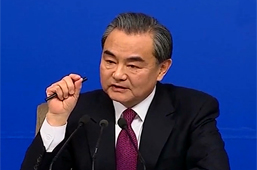In late December 1953, during a meeting in Beijing with a visiting delegation from India, Premier Zhou Enlai first raised the Five Principles of Peaceful Coexistence, the Ministry of Foreign Affairs' website states.
The Five Principles formally took effect with the Agreement on Trade and Intercourse between the Tibet Region of China and India, which was signed in Beijing on April 29, 1954, according to India's Ministry of External Affairs' publicity division.
In its preamble, the pact stated that the two governments had resolved to enter into the present Agreement based on the following principles:
i. Mutual respect for each other's territorial integrity and sovereignty
ii. Mutual non-aggression
iii. Mutual non-interference
iv. Equality and mutual benefit
v. Peaceful co-existence.
Siegfried Wolf, director of research at the South Asia Democratic Forum, a think tank in Brussels, the Belgian capital, said the principles served as the foundation for the relationship between China and India.
"The Five Principles were developed during the high point of the Hindi-Chini Bhai Bhai (India and China are brothers) spirit in 1954," he said.
Indian Prime Minister Jawaharlal Nehru voiced his support for the Five Principles in a speech at the Colombo Conference held from April 28 to May 2, 1954, in Ceylon, present-day Sri Lanka. When he met Zhou on June 28 that year, at the end of the Chinese premier's visit to India, they signed the Five Principles of Peaceful Co-existence into a joint declaration.
"The prime ministers reaffirmed these principles and felt that they should be applied in their relations with other countries in Asia as well as other parts of the world," the Indian Ministry of External Affairs said.
Similar comments appeared in a joint declaration between Zhou and Burmese Prime Minister U Nu on June 29, 1954, following Zhou's visit to the neighboring country.
But according to analysts, it was at the first Asian-African Conference - better known as the Bandung Conference - that the principles spread across continents, thanks to Zhou introducing New China's approach to international relations.
Wolf said incorporating the Ten Principles of Bandung in the Final Communiqué of the Asian-African Conference marked the "peak of the spirit" at the gathering, which aimed to create a fraternity of newly independent Asian and African countries.
Ho Tiang Boon, an assistant professor at Nanyang Technological University in Singapore, said, "The key point here is that China has contributed its own ideas from the start about international relations."
A consensus that China's international relations should be based on the principles was evident among the country's leadership. When Chairman Mao Zedong visited Moscow, the Russian capital, in November 1957, he announced that China thought that all countries should promote the Five Principles.
His comments attracted attention at the United Nations on Dec 11, 1957, when a resolution on peaceful coexistence, introduced by India, Sweden and Yugoslavia, was adopted by the General Assembly.
Lucio Blanco Pitlo, research fellow at the Asia-Pacific Pathways to Progress Foundation, a think tank in Manila, capital of the Philippines, said the principles later emerged as the core of the Non-Aligned Movement, whose founding in 1961 in Belgrade, Yugoslavia, was "a repudiation" of the two competing ideological blocs during the Cold War.
They also brought China a new round of success in the international arena, raising the number of countries with which it had formal diplomatic relations from 23 at the end of 1955 to 50 by 1969, according to the Ministry of Foreign Affairs.
Lai Hongyi, associate professor at the Faculty of Social Sciences at the University of Nottingham in the United Kingdom, said, "This new relationship allowed China to be a core and influential nation in the developing world."
Senior Leader Deng Xiaoping, in his speech to the UN General Assembly in 1974, emphasized the Five Principles for international political and economic relations.
On Jan 17, 1975, the principles were officially written into the preamble to the Constitution of the People's Republic of China and have remained as a diplomatic guide ever since, despite repeated amendments. By the end of July, they had helped the country to form diplomatic relations with 178 nations, according to the Ministry of Foreign Affairs.
Pitlo said it was China's determination to uphold the Five Principles that led to the country adopting a No First Use policy, which refers to a pledge not to use nuclear weapons as a means of warfare, unless first attacked by an adversary using such arms. China pledged the policy in 1964, becoming one of the first countries to do so.
The principles were included in a range of UN documents, becoming the basic norms governing international relations as well as the key basis for international law.
Pitlo said, "As China's rise impacts the world in many ways, the challenge of holding high the banner of the Five Principles will find greater resonance."
On June 28, 2014, at a meeting in Beijing marking the 60th anniversary of the principles, President Xi Jinping said, "China will firmly pursue friendship and cooperation with all other countries on the basis of the Five Principles of Peaceful Co-existence."
According to Marzuki Alie, former speaker of the House of Representatives in Indonesia, China has been applying the principles to efforts to amicably settle maritime disputes in the South China Sea.
Alie recalled his talks with Xi in October 2013 in Jakarta, the Indonesian capital, in which Xi said disputes between China and several Southeast Asian countries over territorial sovereignty and maritime rights would be resolved through peaceful solutions.
Alie said Xi was also committed to stronger relations with the Association of Southeast Asian Nations through various means, such as expansion of the China-ASEAN Free Trade Area, maritime partnerships, cooperation in disaster prevention and mitigation, and joint law enforcement.
Joe Thomas Karackattu, assistant professor at the Department of Humanities and Social Sciences at the Indian Institute of Technology Madras, said that although China has "already articulated the Five Principles as the basis of the Asian security order", it could use them to "create a sense of 'Asianness'" in international affairs.















